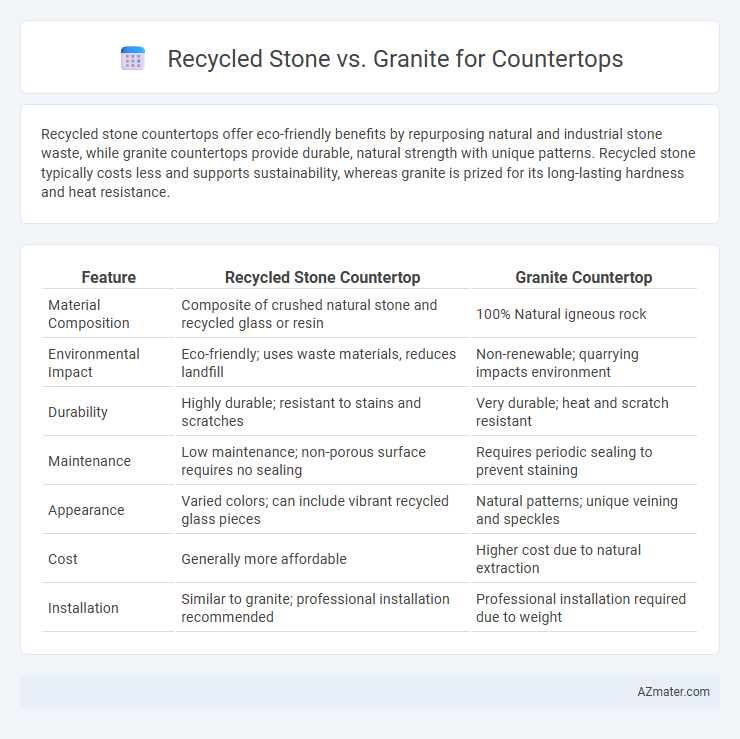Recycled stone countertops offer eco-friendly benefits by repurposing natural and industrial stone waste, while granite countertops provide durable, natural strength with unique patterns. Recycled stone typically costs less and supports sustainability, whereas granite is prized for its long-lasting hardness and heat resistance.
Table of Comparison
| Feature | Recycled Stone Countertop | Granite Countertop |
|---|---|---|
| Material Composition | Composite of crushed natural stone and recycled glass or resin | 100% Natural igneous rock |
| Environmental Impact | Eco-friendly; uses waste materials, reduces landfill | Non-renewable; quarrying impacts environment |
| Durability | Highly durable; resistant to stains and scratches | Very durable; heat and scratch resistant |
| Maintenance | Low maintenance; non-porous surface requires no sealing | Requires periodic sealing to prevent staining |
| Appearance | Varied colors; can include vibrant recycled glass pieces | Natural patterns; unique veining and speckles |
| Cost | Generally more affordable | Higher cost due to natural extraction |
| Installation | Similar to granite; professional installation recommended | Professional installation required due to weight |
Introduction to Recycled Stone and Granite Countertops
Recycled stone countertops, made from crushed stone and industrial waste bound by resin, offer an eco-friendly alternative to traditional granite countertops by reducing landfill waste and conserving natural resources. Granite countertops are composed of natural igneous rock, prized for their durability, heat resistance, and unique, natural patterns that enhance kitchen aesthetics. Both options provide long-lasting surfaces, but recycled stone emphasizes sustainability, while granite is valued for its natural beauty and robustness.
Material Composition: Recycled Stone vs Granite
Recycled stone countertops are composed of crushed stone fragments, glass, and resin binders, creating an eco-friendly material with varied color and texture options. Granite is a natural igneous rock primarily composed of quartz, feldspar, and mica, offering durability and a distinctive grain pattern. The synthetic makeup of recycled stone provides uniformity and sustainability, while granite's natural mineral composition delivers strength and unique aesthetics.
Aesthetic Differences and Design Options
Recycled stone countertops offer a unique, eco-friendly aesthetic with vibrant color variations and embedded glass or mirror pieces that create a mosaic-like appearance, contrasting with granite's natural, consistent veining and granular texture. Granite provides timeless elegance with a wide range of solid, earthy tones and natural patterns ideal for classic or luxurious kitchen designs. Design options with recycled stone emphasize bold, artistic expressions and sustainable appeal, while granite suits traditional, sophisticated environments requiring durability and natural beauty.
Durability and Strength Comparison
Recycled stone countertops offer impressive durability by combining crushed natural stone with resin, creating a surface resistant to chipping and cracking, though they may be less heat-resistant than granite. Granite, a natural igneous rock, boasts exceptional hardness and heat resistance, making it highly durable for heavy daily kitchen use and resistant to scratches and stains. While recycled stone provides eco-friendly benefits and consistent appearance, granite remains the preferred choice for long-lasting strength and robustness in countertop applications.
Environmental Impact and Sustainability
Recycled stone countertops significantly reduce environmental impact by repurposing waste materials, minimizing landfill use and lowering carbon emissions compared to quarrying granite. Granite extraction involves energy-intensive mining and transportation processes that contribute to habitat destruction and higher carbon footprints. Opting for recycled stone promotes sustainability through resource conservation and reduced environmental degradation while maintaining durability and aesthetic appeal similar to granite.
Maintenance and Care Requirements
Recycled stone countertops require less upkeep as they resist stains and scratches better than granite, which demands regular sealing to maintain its durability. Granite surfaces need periodic resealing, usually once every 1-2 years, to prevent moisture penetration and staining. Cleaning recycled stone involves mild detergents and damp cloths, while granite care necessitates pH-neutral cleaners to avoid etching or dulling the polished finish.
Cost Analysis: Recycled Stone vs Granite
Recycled stone countertops typically cost between $30 and $50 per square foot, offering a budget-friendly alternative to granite, which ranges from $40 to $100 per square foot depending on quality and origin. Installation expenses for recycled stone are generally lower due to its lighter weight, reducing labor costs compared to heavier granite slabs. Long-term maintenance costs also favor recycled stone, as it is more resistant to staining and requires less frequent sealing than natural granite, resulting in overall cost savings.
Installation Process and Considerations
Recycled stone countertops typically require specialized installation due to their composite materials, necessitating experienced fabricators familiar with handling resin and recycled aggregates for precise cuts and secure adhesion. Granite installation involves traditional methods with heavy slabs, requiring sturdy substructures and careful sealing to prevent staining and maintain durability. Considerations include weight support, edge finishing, and seam visibility, with recycled stone offering more customizable shapes and uniform surfaces, while granite provides natural veining and higher heat resistance.
Popular Brands and Product Options
Caesarstone and LG Viatera lead the market in recycled stone countertops, offering eco-friendly surfaces made from quartz and recycled glass with durability comparable to granite. Granite remains a top choice with renowned brands like MSI and Cosentino providing a wide range of natural stone options featuring unique veining and color variations. Both recycled stone and granite countertops come in diverse styles and finishes, catering to various design preferences and budget considerations.
Final Verdict: Which Countertop Material Is Right for You?
Recycled stone countertops offer eco-friendly appeal and unique aesthetics with a blend of natural and man-made materials, making them ideal for environmentally conscious homeowners seeking custom designs. Granite provides unmatched durability, natural beauty, and heat resistance, perfect for high-traffic kitchens requiring a timeless and robust surface. Choosing between recycled stone and granite depends on priorities like sustainability, budget, maintenance, and style preferences, with granite favored for longevity and recycled stone for green innovation.

Infographic: Recycled stone vs Granite for Countertop
 azmater.com
azmater.com